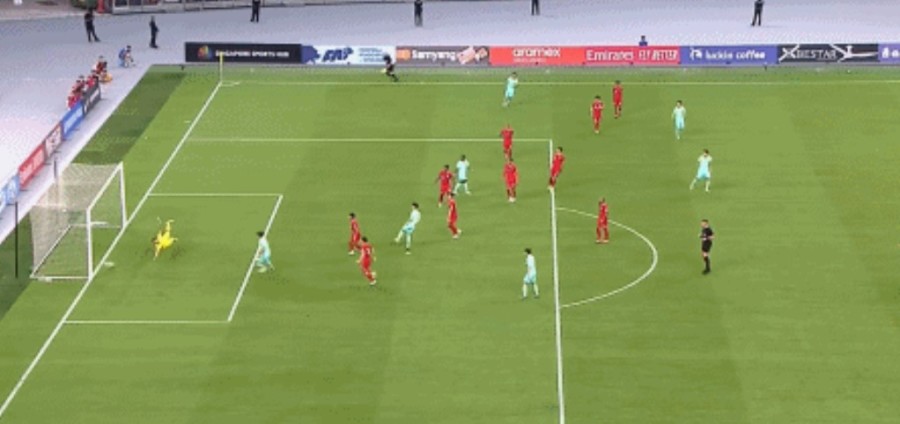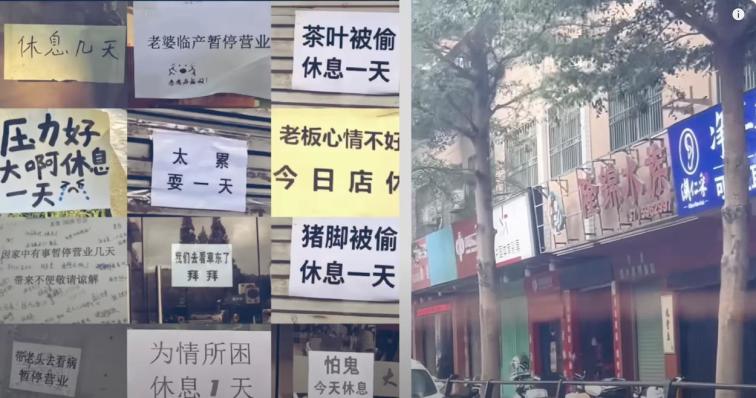Illustration: The image shows a soccer match between Singapore and China during the 2026 World Cup qualifiers on March 21, 2024. (Video screenshot)
[People News] The performance of China's national soccer team in 2024 has been underwhelming, to say the least. In 13 matches across the Asian Cup and World Cup qualifiers, the Chinese men's team achieved only 3 wins, 4 draws, and 6 losses. This likely broke the hearts of die-hard fans once again. Additionally, scandals such as the recent sentencing of former national coach Li Tie to 20 years in prison have further exposed the corruption and filth pervasive in Chinese soccer.
Interestingly, according to CCP state media, Premier Li Qiang chaired a State Council executive meeting on December 16. Alongside tasks like implementing decisions from the Central Economic Work Conference, the meeting surprisingly included discussions on soccer development. The meeting emphasized that "revitalizing soccer is a key aspect of building a strong sports nation, requiring greater efforts to implement policies and advance soccer development to new levels."
Why is this noteworthy? Because the previous leader guiding China's soccer development was none other than CCP General Secretary Xi Jinping. On June 16, 2017, Xinhua News Agency published a high-profile article under the pseudonym Xin Shiping, declaring that "Xi Jinping has charted the 'style of play' for the national soccer team's development."
Xi's guidance came during a meeting with FIFA President Gianni Infantino at the time. Back then, China's men's team had just tied 2-2 against the weak Syrian side in the Asian qualifiers for the World Cup, leaving their World Cup prospects bleak.
Xi Jinping initially sought to excuse the national team's failures, emphasizing the need to "acknowledge gaps and confront issues," pointing out that "overall, Chinese soccer lags significantly behind the world's leading soccer nations in both grassroots participation and elite-level performance." Addressing these problems, he argued, requires determination and patience. Furthermore, Xi stated that "the development of the national soccer team must not lose the soul of sportsmanship," asserting that "the essence of soccer lies not just in competition, but in enhancing public fitness and fostering patriotism, collectivism, and a spirit of resilience."
After his excuses, Xi outlined reforms for soccer management, proposing the establishment of a professional and efficient organizational system suited to global soccer standards and China's unique circumstances. He emphasized developing youth soccer, improving infrastructure such as soccer fields, and strengthening international exchanges. According to the article, Xi's guidance offered "new inspiration and hope" for Chinese soccer.
Why would a busy CCP leader like Xi dedicate time to directing soccer? This is closely related to Xi's status as a longtime soccer fan. On June 5, 2013, during a speech in Mexico City, Xi declared, "I am a soccer fan." He had praised British soccer star David Beckham, who gifted Xi commemorative soccer shoes and a jersey in Los Angeles. Similarly, in 2014, Argentinian officials presented Xi with a No. 10 jersey from their national team.
In July 2011, during a meeting with South Korean lawmakers led by Sohn Hak-kyu, Xi outlined his "three dreams" for Chinese soccer: qualifying for the World Cup, hosting the tournament, and eventually winning it.
Under Xi's leadership, major Chinese corporations like Alibaba invested in soccer, and even the controversial Evergrande chairman, Xu Jiayin, poured significant funds into the sport. The Chinese Football Association (CFA) aligned with Xi's directives in several ways, such as hiring expensive foreign coaches and players and arranging matches against internationally renowned teams. However, areas like youth soccer development, infrastructure improvements, and organizational management saw little progress. As a result, despite significant financial investments, the performance of the national team remained dismal, and corruption within the CFA and the national team became exposed.
Why did Xi's prescribed "style of play" fail? What's the root issue with Chinese soccer? Comments from Simon Chadwick, a professor at Lyon Business School and director of the Eurasian Sport Industry Center, may provide some insights.
"There are specific circumstances in China that hinder the development of soccer, similar to what we observe in other parts of the world," Chadwick noted. "Great soccer players are generally creative thinkers and highly independent individuals, adept at making personal decisions and judgments. I don't believe China's education system fosters the soft skills required for developing exceptional players." He added, "The impression I get is one of constant government and bureaucratic interference in Chinese soccer."
Indeed, under a one-party authoritarian regime, where China's education system does not prioritize cultivating independent personalities and critical thinking, and where the CCP's focus is on achieving gold medals at all costs, the development of Chinese soccer faces systemic challenges. The lack of independent oversight within the CCP system further hampers progress, making it difficult for Chinese soccer to achieve significant success on the international stage. This fundamental issue explains why Xi's "style of play" failed.
The fact that Li Qiang is now taking over responsibility for soccer development indirectly signifies that Xi's power has waned. Even the authority to guide the national team's "style of play" has been stripped from him. △
(Originally published by People News)











News magazine bootstrap themes!
I like this themes, fast loading and look profesional
Thank you Carlos!
You're welcome!
Please support me with give positive rating!
Yes Sure!